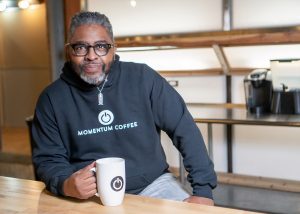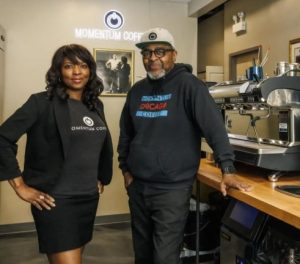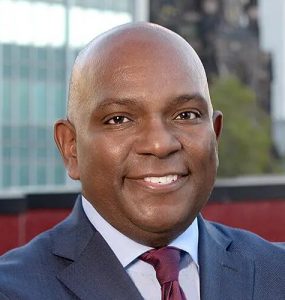Program boosts businesses in under-developed parts of Cook, targets Rockford
By Kevin Beese Staff Writer — April 5, 2025
Tracy Powell at a Momentum Coffee location in Chicago. TREND, a business advocate, helped Momentum establish its first store. TREND is now looking to help generate business in Rockford. (Provided photos)
Tracy Powell would not be where he is today without a helping hand.
The owner of Momentum Coffee, with five Chicago locations, got up and running with the help of TREND, a program that supports under-developed areas with commercial real estate assistance.
“It’s how I got started,” Powell said of the assistance program.
Powell established his first location in the South Loop with the help of $150,000 from the Chicago Community Loan Fund that TREND helped secure for him.
When the owner of the South Loop building was looking to sell, Powell approached TREND about creating a partnership with the business assistance group and other entrepreneurs to take over the building. They made it happen.
Powell’s initial idea was to create a coffee and co-working space with his first site in 2019. However, the COVID-19 pandemic arrived in 2020, throwing the business model for a loop.
“Co-working died and we delivered coffee at our front door for three or four months,” Powell said. “We rethought the process and did a rebuild, and we leaned into coffee.”

Nikki Bravo and Tracy Powell, owners of Momentum Coffee, with five locations in Chicago
Momentum Coffee, founded and owned by Powell and his wife, Nikki Bravo, has since expanded to include locations in Millennium Park, Garfield Park Conservatory, and the Austin and Englewood neighborhoods.
“It’s part of their narrative, helping build communities,” Powell said of TREND. “We didn’t start with traditional levels of funding.
“Financial institutions do not normally lend money for businesses in some of the neighborhoods we have gone into. TREND accepts the risk with start-ups and works with organizations in under-developed areas.”
Finding stakeholders
Lyneir Richardson, TREND CEO, said the premise is that people in an under-developed area “buy back the block” by becoming stakeholders in local projects.
“We help people of low and moderate income to understand commercial real estate,” Richardson said. “If people have a little ownership in a neighborhood, they are going to protect it and respect it.
“If you have respect around the community, you are going to increase wealth and strengthen the neighborhood.”
Richardson said his buy back the block program is geared to generate business in higher-crime, lower-income neighborhoods.
“We are developing strategies from economic structuring,” he said.
The TREND CEO said people are taken aback when given a chance to own a piece of local commercial real estate.

Lyneir Richardson
“I ask them, ‘When was the last time somebody knocked on your door and asked if you wanted to own commercial property?’” Richardson said.
TREND owns six shopping centers – three in Chicago, one in Olympia Fields and two in Baltimore.
He said the organization has 384 community investors.
“Some people invest $1,000. Some invest $10,000,” Richardson said. “The average investment is $2,270.
“Seventy percent of our investors are people of color and 40 percent of our investors are women.”
He said investors are treated as owners in the shopping center or business.
“We come in and get a neighborhood on the cusp of change,” Richardson said. “I tell them the neighborhood is about to change and justify their investment.”
TREND will be bringing its Buy Back the Block program to Rockford.
Wealth-building
Richardson said the strategy represents an opportunity that’s been proven to deliver long-term wealth-building, community cohesion and quality of life improvements to inner-city residents.
“I have a passion for this work,” Richardson said. “My dream is that in five or 10 years, people see changes in local commercial property and that there is some financial acumen and a connection to ownership.
“I want to have people walk by a business area and say, ‘My family owns that.’”
Richardson noted that are never guarantees in real estate, but investors could see 12 percent to 15 percent annual returns on their capital.
“In four or five years, people can see three, four or five times their money,” Richardson said. “The work we do is find those right investments.
“We want to do this in Rockford. We will partner with the churches. That is the nature of it.”
He said his group put Rockford on their radar after K. Edward Copeland, lead pastor of New Zion Baptist Church, talked with Richardson about the need for more community development in the city.
“He said, ‘People need to strengthen their pride in the city.’” Richardson remembered from their 2020 conversation.
“Economic development drives community development,” Richardson said. “The power of the people can use a business’ strength to make an area strong.”
Richardson refers to people in urban locales investing in and owning commercial real estate as “The Playbook.”
New Zion’s Copeland expects The Playbook to be a winning strategy for Rockford.
“Targeted community development initiatives in distressed areas of Rockford will boost community pride, safety and neighborhood revitalization,” Copeland said. “We don’t need to reinvent the wheel with this effort. The strategy outlined in The Playbook has been tested, reviewed and has yielded tangible results in other similarly situated communities.”
kbeese@chronicleillinois.com







